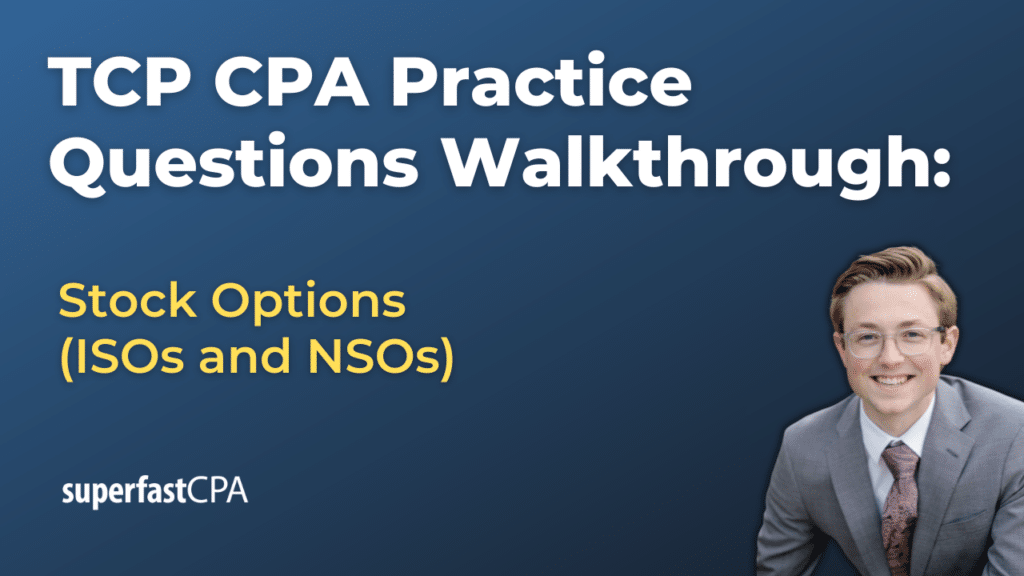In this video, we walk through 5 TCP practice questions teaching about stock options (ISOs and NSOs). These questions are from TCP content area 1 on the AICPA CPA exam blueprints: Tax Compliance and Planning for Individuals and Personal Financial Planning.
The best way to use this video is to pause each time we get to a new question in the video, and then make your own attempt at the question before watching us go through it.
Also be sure to watch one of our free webinars on the 6 “key ingredients” to an extremely effective & efficient CPA study process here…
Stock Options (ISOs and NSOs)
Stock options as equity compensation are a popular tool used by companies, especially startups and growth-oriented firms, to attract, motivate, and retain employees by aligning their interests with the success of the company. There are two main types of stock options typically offered: Incentive Stock Options (ISOs) and Non-Qualified Stock Options (NSOs). Each type has distinct tax implications and rules governing their use.
(ISOs) Incentive Stock Options
ISOs are only available to employees (not consultants or board members) and offer potential tax benefits if certain conditions are met. When an ISO is exercised, the employee does not pay tax on the difference between the market price and the strike price at the time of exercise for regular income tax purposes. This “spread” may be subject to the Alternative Minimum Tax (AMT), however, which can affect high-income earners.
Conditions for Favorable Tax Treatment: To qualify for long-term capital gains tax rates, the shares purchased through ISOs must be held:
- For more than one year after the exercise date.
- For more than two years after the date the options were granted.
Example:
Let’s say an employee, Sarah, is granted 1,000 ISOs at a strike price of $10. Two years later, the market price rises to $30, and Sarah exercises her options. She pays $10,000 to acquire $30,000 worth of stock but pays no regular income tax on the $20,000 spread at that time, though this spread could be subject to AMT. If Sarah sells the stock after holding it for more than a year from the exercise date and more than two years from the grant date, she will pay long-term capital gains tax on the gains instead of ordinary income tax.
NSOs (Non-Qualified Stock Options)
NSOs can be granted to employees, directors, or consultants and are less restrictive than ISOs. The key difference is the immediate tax implication when exercised. The difference between the strike price and the market price at the time of exercise is considered taxable income and is taxed as ordinary income.
Example:
Tom is granted 1,000 NSOs at a strike price of $10. When he exercises the options a year later, the market price is $30. Tom has to report $20,000 ($20 x 1,000) as ordinary income in the year he exercises the options, which will be included in his W-2.
Selling the Shares: When shares acquired through NSOs are sold, the sale may result in additional gain or loss. The cost basis of the shares will be the market price at the time of exercise. If Tom sells the shares later for $40 each, he would calculate his capital gain as $10 per share ($40 – $30), and this gain would be taxed as either short-term or long-term capital gain depending on the holding period from the exercise date.
Planning and Strategy
Choosing between ISOs and NSOs involves considering the immediate tax implications, eligibility, and potential financial outcomes. Employees awarded ISOs must carefully plan around the AMT and holding periods to maximize tax benefits. Those with NSOs need to prepare for the immediate tax burden upon exercise, which can be substantial if the stock price has increased significantly.













